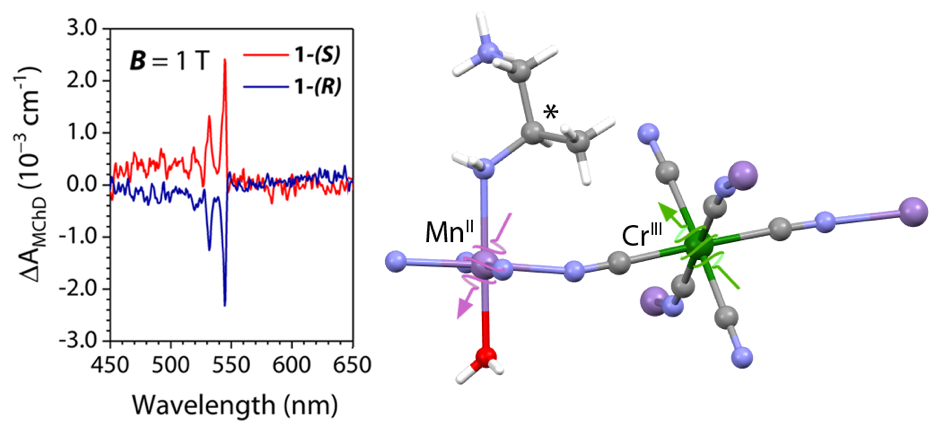Magneto-Chiral Dichroism (MChD) is a non-reciprocal manifestation of light-matter interaction that can be observed in chiral systems possessing a magnetization, either spontaneous or induced by an external magnetic field. Predicted in the 80s and experimentally detected 15 years later at LNCMI, it features a differential absorption or emission of unpolarized light that depends on the relative orientation of the magnetization with respect to the direction of light propagation and on the absolute configuration of the system. Molecular chemistry is the best-suited route towards systems combining chirality and magnetism. The coexistence of molecular chemists and of a unique renewed experimental setup present at LNCMI allows to investigate challenging questions raised by this fascinating effect. Hence, in a chiral ferrimagnet derived from Prussian Blue, MChD was observed up to its magnetic ordering temperature (TC = 40K) paving the way towards technological applications, such as optical readout of magnetic data with unpolarized light [1]. Moreover, a molecular system featuring Mn(III) ion has shown intense MChD in the visible range, highlighting the effect of spin-orbit coupling onto the magnitude of MChD signals [2]. A recent review sums up the last achievements and remaining challenges in this field [3].
Recent Publications:
1. A Chiral Prussian Blue Analogue Pushes Magneto-Chiral Dichroism Limits
M. Atzori, I. Breslavetz, K. Paillot, K. Inoue, G. L. J. A. Rikken, C. Train
J. Am. Chem. Soc. 141, 20022 (2019)
2. Magnetic Anisotropy drives Magneto-Chiral Dichroism in a Chiral Molecular Helix probed with Visible Light
M. Atzori, F. Santanni, I. Breslavetz, K. Paillot, A. Caneschi, G. L. J. A. Rikken, R. Sessoli, C. Train
J. Am. Chem. Soc. 142, 13908 (2020)
3. Magneto-Chiral Dichroism: A Playground for Molecular Chemists
M. Atzori, G. Rikken, C. Train
Chem. – A Eur. J. 26, 9784 (2020)

Figure. On the left, Magneto-Chiral Dichroism (MChD) arising from the difference in absorption (AMChD) at the Mn(II) sites for the (S) (red) and (R) (blue) enantiomers of the chiral [Mn(II)Cr(III)] Prussian Blue analog whose molecular structure is (partially) shown on the right.
